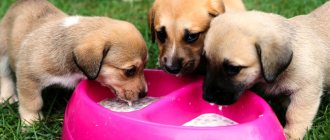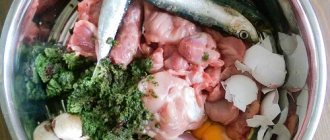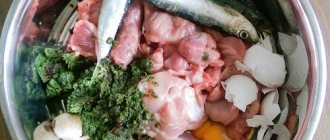The birth of puppies is an event for which you need to carefully prepare. One of the important factors in the growth process of an animal is nutrition. Owners should familiarize themselves with the feeding habits of newborn puppies in order to minimize the development of gastrointestinal diseases. You can find out what to feed one-week-old and one-month-old puppies from the article.
Feeding small puppies
Basic feeding rules
How to feed a puppy from birth without a mother is a common question for dog lovers who are faced with their offspring refusing mother’s milk. When choosing a diet for dogs, it is necessary to take into account some important conditions that veterinarians note:
- babies need to be fed at the same time every day;
- food for animals should be warm, but not hot;
- after eating food, it is worth postponing active games so that the food is absorbed in the body;
- Puppies need clean, plain water. Therefore, they must have access to it constantly.
- It is not recommended to mix dry food with natural food. If initially the offspring ate natural food, and now the owner wants to introduce purchased food into their diet, then it is worth discussing this issue with a veterinarian. A sudden transition to a new food can trigger the development of stomach diseases;
- the use of salt should be kept to a minimum;
- Artificial feeding of puppies takes place using special baby food enriched with vitamins, minerals, and microelements.
Important! The main rule of feeding puppies of any breed (Yorkie, Bulldog, German Shepherd, French Spitz, Husky, Chihuahua, Terrier) is to fill the diet with vitamins and amino acids for full development.
Nutrition for babies from 2 months
Photos of babies
Tell me, have you or someone you know ever had to care for puppies left without a mother? How did you cope with this difficult task? – share your experience. We are waiting for your stories, photos of your pets in the VKontakte group! Join, discuss, comment.
Source
Independent artificial feeding of a newborn puppy
How to feed a newborn puppy without a mother at home is one of the main questions for many dog breeders. If children refuse breast milk, they can be fed artificially, that is, food that is rich in macroelements, fiber, and vegetable protein. What to feed newborn puppies without a mother will be discussed below.
Features of feeding a dog with baby food
Despite the fact that baby food contains virtually no harmful additives, it should not be the main food for puppies. With frequent use of these products, animals may develop gastrointestinal pathologies. For newly born babies, 1-2 spoons of natural mixture per day is enough. When choosing food, you must carefully study the composition of the products. Food should not contain preservatives, large amounts of dyes, or aromatic additives. Puppies need to be fed fresh food.
Preparing a mixture for feeding puppies
What to feed puppies if the dog does not have milk is one of the popular questions on pet forums. If the mother does not have milk or she refuses to feed the newborn puppies, then you can prepare the milk formula yourself. To prepare it, use boiled water and glucose or boiled milk and 1 raw chicken yolk. All ingredients are thoroughly mixed until a homogeneous mass is formed, filtered through cheesecloth, boiled for 5 minutes, cooled to room temperature. Be sure to give your pets the mixture on the day it was prepared. Babies should not be fed food that is not fresh. This can negatively affect their stomach function.
Important! Dog breeders should take into account that all utensils in which dog food will be prepared must be sterilized and disinfected. Before feeding, you need to check the temperature of the mixture so that it is not too hot.
Puppy feeding position
The most optimal position for feeding small dogs is lying on their stomach with their head slightly raised. In this position, babies digest food better and cannot choke. To prevent puppies from choking, dog owners must monitor their breathing and behavior. If the animal's heartbeat accelerates, you need to pull out the pacifier so that the pet can fully swallow the food.
Feeding a newborn baby
We monitor our weight
When feeding a newborn puppy, you need to monitor the baby’s weight and track how much he can eat in one feeding. Regular baby scales will do.
It is normal not to gain weight in the first few days after birth. It's normal to lose up to a third of your body weight:
- at the age of up to 6 days – from 15% to 20%;
- at the age of 7-13 days – from 22% to 25%;
- at the age of 14-20 days – from 30% to 32%.
Don't worry about being underweight. You need to contact a veterinarian in 1-2 days if the situation does not improve.
Feeding a newborn puppy is a big responsibility. If there are several kids, then the task becomes much more complicated. But a caring owner will do everything to ensure that the puppies do not suffer from hunger and disease and grow into big, happy dogs.
Interesting topics
What else to read:
- Birth of a puppy, first aid, careContents of the articlePreparing for childbirthFirst aid for an animal during childbirthHelping a dog in.
- Early socialization of a puppy Contents of the article Why you need to socialize a dog Three stages of early socialization First stage Second stage Third.
- How to choose toys for a puppy and how to play with him Contents of the article Why does a puppy need toys Types of dog toys How to choose toys for a puppy Play with.
- What to do if the puppy is picky about food Contents of the article Why is the puppy picky? Possible reasons How to correctly change the brand of food We adjust the food.
© Veterinary clinic "Belanta", 2004—2021, Moscow
First feeding of puppies
Complementary feeding begins on the 20th day of life of the offspring. During this period, they are teething, so it becomes painful for the mother to feed them. The type of complementary feeding depends on the nutrition of the parents. If the mother eats dry food, it is recommended to give it to the children as well. If the dog is kept on natural food, it should also be prepared for the offspring. The transition should be gradual. At first, complementary feeding is carried out once a day, the rest of the time the puppies eat their mother's milk. Then - 2-3 times a day. When the offspring completely refuses mother's milk, they need to be fed 5-6 times a day with the selected type of food.
Special blends
It is extremely important to choose an adequate substitute for breast milk, because it is not just food, but the only source of nutrients, microorganisms necessary for the development of the body and the creation of primary immunity in the baby. Under no circumstances should regular milk be used for these purposes.
There are two ways to replace breastfeeding for a real mother:
- Making homemade formula from cow's milk that needs added nutritional value. To do this, add 1 egg yolk, 2 drops of vitamins A, D and 2-3 ml of vitamin C (ascorbic acid) to 100 ml of liquid. The entire composition is stored for no more than a day and is heated to a warm state if necessary.
- Special milk substitutes produced industrially. This is the most suitable option, since the mixture already includes all the nutrients in the required proportions. The owner can only dilute the powder to the required consistency, following the instructions. Many manufacturers around the world produce special nutrition for breastfeeding, so you can easily find the right one.
Feeding the puppy natural food
If a decision has been made to switch babies to natural food, then dog owners should not add dry food to the menu at the same time. This leads to stomach diseases. Natural food should not be too fatty or salty. It is also worth excluding smoked meats. The menu may include the following products:
- meat (beef, chicken);
- vegetables;
- milk;
- porridge;
- bran;
- cottage cheese;
- kefir.
Important! The pet's diet should be balanced. That is, with the presence of the required ratio of BJU, minerals, and vitamins. I’m writing it’s better to steam it.
Constipation
Constipation in very young dogs is considered an extremely dangerous disorder of the body, since intoxication develops very quickly, due to which the baby may die in a few days.
There are several reasons why such trouble can occur in artificially fed puppies:
- Lack of beneficial bacteria. Part of the inoculation into the intestines and stomach is done during childbirth, but the animal receives most of the beneficial bacteria in the first hours of life along with colostrum, which is not so much a nutritional cocktail as a landing of the necessary microorganisms. If the animal does not receive them, then problems with digestion will be ensured.
- Lack of stimulation. In the first weeks of life, the baby himself is not able to go to the toilet. His mother helps him with this, licking the anus and urethra after each feeding. If for some reason the baby is left without the care of his mother, then you will have to take on this responsibility.
- Wrong nursing cocktail.
- The transition from milk food to adult food at the age of 1 month also causes digestive problems. This is quite understandable, since the already established microflora needs to adapt to working with coarser foods of various types and learn to assimilate it.
Feeding volumes and schedule
How much food to make per day by volume is a common question among dog breeders. The dosage of daily servings depends on the weight of the dogs. In about a day, the puppy should eat about 8% of its current weight. That is, if a small pet weighs 2 kg, then he needs to consume no more than 160 g of food per day.
From two to four months
At 2 months of age, dog owners can introduce more solid foods every 3-5 days to get the puppies accustomed. This includes lamb, fish products, carrots, and zucchini. What is the menu for the day:
- morning - cottage cheese with milk;
- second breakfast - boiled meat, rice, vegetables;
- lunch - cottage cheese and raw egg;
- afternoon snack - turkey, stewed vegetables;
- dinner - boiled cabbage, raw meat.
You can add fish oil to your diet to strengthen your body.
Feeding puppies from 4 months of age
From four to six months
How to feed pets, menu for 1 day:
- breakfast - cottage cheese with milk, fruit;
- lunch - liver (kidneys), boiled rice, vegetables;
- afternoon snack - kefir, cottage cheese;
- dinner - boiled meat, fish with vegetables.
At this stage, you can reduce the number of meals to 4 per day. Is it possible to feed a puppy with cow's milk? Breeders often ask. It is not advisable to feed babies full-fat cow's milk alone. It can harm the functioning of the stomach.
From ten to twelve months
Sample daily menu for puppies:
- morning - alternate meat and dairy foods every other day;
- evening - boiled meat/fish with rice and vegetables.
From 10 to 12 months of age, animals are fed 2 times a day.
Important! To strengthen the body, you can also introduce fish oil and natural mineral supplements into your diet.
Follow the regime
For the first 7-10 days, the puppy should eat every 3-4 hours, both day and night. Obviously, such a feeding schedule is very tiring, but it should not be violated, especially if the pet is sick and weakened, otherwise it will grow and develop poorly.
Hurry up, choose a box and find out what gift awaits you
Discount on pet insurance
Promo code copied to clipboard
When can you switch to dry food?
They switch to dry food when the puppies' teeth are formed and strengthened. It is better to introduce dry food into the diet at the age of 6-8 months. Depending on the breed, the period may vary less or more. When switching to dry food, it is necessary to minimize the amount of natural food in the diet. Combining feeds can negatively affect the functioning of the gastrointestinal tract.
Nutrition of newborn puppies is an important moment in their development. The diet should be filled with vitamins and minerals, fiber, and amino acids. If the dog refuses to feed the puppies, then milk formula and baby food are added to the menu. After 2-3 weeks, the first complementary foods begin. At the age of 2-3 months, the dog can already be accustomed to nutritious food, gradually adding new products to the menu.
Reviews
Alisa, Kazan
“I feed my Yorkie Pronature. I believed the positive reviews on the Internet - and did not regret it. It contains only natural meat, flax seed, vitamin-rich apples, carrots, and cranberries. I like that vitamin E is used instead of preservatives. After switching to this food, the dog’s digestion returned to normal. It can be seen that the granules are well absorbed. The Yorkie has a lot of energy, and all the tartar on his teeth has been cleared.”
Mikhail, St. Petersburg
“We bought a Spitz for the child. The breeders fed him Acana, but we decided not to change the diet. We feed dry granules for miniature breed puppies, everyone is happy. The Spitz has a good appetite and plenty of energy. No eating disorders or allergies were noted. And, most importantly, the fur has become very beautiful and fluffy.”











